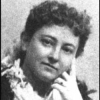Olive Schreiner

Olive Schreiner
Olive Schreinerwas a South African author, anti-war campaigner and intellectual. She is best remembered today for her novel The Story of an African Farm which has been highly acclaimed since its first publication in 1883 for the bold manner in which it deals with some of the burning issues of the day, including agnosticism, existential independence, individualism, the professional aspirations of women, and the elemental nature of life on the colonial frontier. In more recent studies she has also been...
NationalitySouth African
ProfessionWriter
Date of Birth24 March 1855